Boyko Borisov is the new prime minister of Bulgaria
Adelina Marini, July 6, 2009
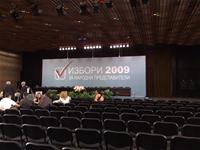 I left the press conferences of the first 3 parties after the parliamentary elections in Bulgaria with mixed feelings, where GERB (Citizens for the European Development of Bulgaria) is leading convincingly with 100% of the votes counted but with still preliminary results. And the way many people were happy that GERB and its leader Boyko Borisov won, the same way well informed people, including colleagues journalists, were skeptic and even angry because this victory was another proof that Bulgarians cannot think rationally, they always go after what's new, what's shallow and unreliable. But in the same time when someone hears the press conferences of the unreliable firefighter Boyko Borisov then the one of the well educated and reliable prime minister Sergey Stanishev and of the experienced politician Ahmed Dogan, he would start thinking that, may be, it's just the other way round.
I left the press conferences of the first 3 parties after the parliamentary elections in Bulgaria with mixed feelings, where GERB (Citizens for the European Development of Bulgaria) is leading convincingly with 100% of the votes counted but with still preliminary results. And the way many people were happy that GERB and its leader Boyko Borisov won, the same way well informed people, including colleagues journalists, were skeptic and even angry because this victory was another proof that Bulgarians cannot think rationally, they always go after what's new, what's shallow and unreliable. But in the same time when someone hears the press conferences of the unreliable firefighter Boyko Borisov then the one of the well educated and reliable prime minister Sergey Stanishev and of the experienced politician Ahmed Dogan, he would start thinking that, may be, it's just the other way round.
The main mark for the maturity of the democratic thought is the attitude toward media. Under this condition I will give Boyko Borisov very good B (for now) because given that each party had  only 30 min. for its press conference, he spoke no more than 5 min and than gave the floor for questions. Unlike Sergey Stanishev who, obviously, had relied on other methods to attract public attention, because for 4 years he has not learned that talking long time and saying nothing is insulting even for the most stupid person. He did not make an exception last night and spoke more than 20 min without responding straight to the questions and the time for the press conference was exceeded for which the spokesman of the Ministry of Foreign Affairs is to blame because he was the one to mediate the press conferences. The so called experienced and cunning politician Ahmed Dogan also spoke a long time, unfocused, as if he was confessing, edifying or, simply abusing the microphone. He was responding to the questions of journalists by explaining often that he was not obliged to give any explanations to anyone.
only 30 min. for its press conference, he spoke no more than 5 min and than gave the floor for questions. Unlike Sergey Stanishev who, obviously, had relied on other methods to attract public attention, because for 4 years he has not learned that talking long time and saying nothing is insulting even for the most stupid person. He did not make an exception last night and spoke more than 20 min without responding straight to the questions and the time for the press conference was exceeded for which the spokesman of the Ministry of Foreign Affairs is to blame because he was the one to mediate the press conferences. The so called experienced and cunning politician Ahmed Dogan also spoke a long time, unfocused, as if he was confessing, edifying or, simply abusing the microphone. He was responding to the questions of journalists by explaining often that he was not obliged to give any explanations to anyone.
 Another mark for political and intellectual maturity are the introductions. Boyko Borisov demonstrated full preparedness for what was expected him to say. The first thing he did was to turn to the Bulgarian Muslims: "Everyone saw which parties brought tens of thousands of voters and this will lie on their conscience. All Bulgarian Muslims should feel safe and they will have place in governing of the country".
Another mark for political and intellectual maturity are the introductions. Boyko Borisov demonstrated full preparedness for what was expected him to say. The first thing he did was to turn to the Bulgarian Muslims: "Everyone saw which parties brought tens of thousands of voters and this will lie on their conscience. All Bulgarian Muslims should feel safe and they will have place in governing of the country".
Against this background the introductory words of Sergey Stanishev and Ahmed Dogan had to show that Bulgarians are stupid and inadequate. According to Stanishev the campaign of the BSP (Bulgarian Socialist Party) was more than good and adequate but obviously was not well explained to the voter. This insulted me personally because I, after taking the distance Kavarna-Sofia (600 km) for more than 8 hours because of the lack of good roads and highways, had never expected anything from the campaign of the ruling parties. I just wanted them to build highways for 4 years which would have stimulated trade, travel for leisure and would have cut distances.
According to Ahmed Dogan our country has "political elite" with very good experience and any diversion from it would be disastrous for Bulgaria. To translate this to the "stupid" voter, this means 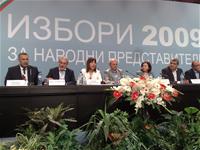 that any decision of the Bulgarian voter to choose a leader that is not coming from the "political elite" is disastrous. While the fact that the DPS (the Movement for Rights and Freedoms, perceived as representing the Turkish minority in Bulgaria) is increasing its support without any logical explanations and against the background of the active movement of many buses with tourists across the country as well as the holes in the election legislation, looks awkward but it didn't seem to bother the leader of the DPS.
that any decision of the Bulgarian voter to choose a leader that is not coming from the "political elite" is disastrous. While the fact that the DPS (the Movement for Rights and Freedoms, perceived as representing the Turkish minority in Bulgaria) is increasing its support without any logical explanations and against the background of the active movement of many buses with tourists across the country as well as the holes in the election legislation, looks awkward but it didn't seem to bother the leader of the DPS.
In their forewords Mr. Stanishev and Mr. Dogan "played" with the ethnic card as the only explanation for the hardships of humanity. "For the last 20 years the BSP has always worked for the ethnic stability, piece and the development of the Bulgarian ethnic model for me, as a socialist, it is unacceptable the ethnic card to be played", were the words of the prime minister Stanishev. "I ask the observers of NATO and the EU very carefully to follow the process of playing the ethnic card because the basic foundation of democracy itself is put at risk. I am not threatening anyone, but ...", were the words of Mr. Dogan.
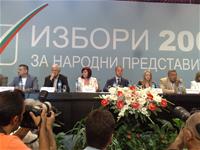 And while the mayor of Sofia had some achievements to praise as a "prime minister" of the largest and most populated city in Bulgaria, giving home and work daily to almost half of the population of Bulgaria, the leaders of the BSP and the DPS said the reason for their loss was entirely outside them. According to Stanishev the reasons for his loss were the economic crisis which, he again stressed, came from outside and has nothing to do with what'd been done or not done in Bulgaria. The playing of the ethnic card was another reason for the voter to withdraw. And to the call of Mr. Stanishev the DPS to answer why it had created such an attitude with the pre-election statements of Ahmed Dogan, the leader of the DPS explained that it was a pity some parties to wipe their hands with the Movement and that it was these excuses that had increased the activity of voters and the support for the Movement.
And while the mayor of Sofia had some achievements to praise as a "prime minister" of the largest and most populated city in Bulgaria, giving home and work daily to almost half of the population of Bulgaria, the leaders of the BSP and the DPS said the reason for their loss was entirely outside them. According to Stanishev the reasons for his loss were the economic crisis which, he again stressed, came from outside and has nothing to do with what'd been done or not done in Bulgaria. The playing of the ethnic card was another reason for the voter to withdraw. And to the call of Mr. Stanishev the DPS to answer why it had created such an attitude with the pre-election statements of Ahmed Dogan, the leader of the DPS explained that it was a pity some parties to wipe their hands with the Movement and that it was these excuses that had increased the activity of voters and the support for the Movement.
The leader of the BSP made some more, quite surprising from the logical point of view, statements. "The claim that we have spent the budget for pre-election purposes is irresponsible 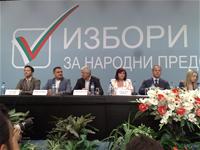 because the increase of pensions was based upon a law, approved some years ago" - in other words the world may end but whatever was approved years ago it must happen not matter on what price. And more: "We will not support and accept any devaluation and sale of national assets. Many people did not believe us". Here I would ask Mr. Stanishev whether under "sale and devaluation of national assets" he meant exchanges? Because it was his party that scored a record for the number of exchanges of state property at a very law price and with no conditions. He also did not miss to once again frighten the innocent and scrub about the danger which Mr. Boyko Borisov and Mr. Ivan Kostov represent in a coalition. In the meantime he answered a question that was put inaccurately that, in fact, the BSP would have hardly made a whole term with NDSV as being the only partner in a coalition.
because the increase of pensions was based upon a law, approved some years ago" - in other words the world may end but whatever was approved years ago it must happen not matter on what price. And more: "We will not support and accept any devaluation and sale of national assets. Many people did not believe us". Here I would ask Mr. Stanishev whether under "sale and devaluation of national assets" he meant exchanges? Because it was his party that scored a record for the number of exchanges of state property at a very law price and with no conditions. He also did not miss to once again frighten the innocent and scrub about the danger which Mr. Boyko Borisov and Mr. Ivan Kostov represent in a coalition. In the meantime he answered a question that was put inaccurately that, in fact, the BSP would have hardly made a whole term with NDSV as being the only partner in a coalition.
And the question was inaccurate because it was not the BSP that was responsible for the tripartite coalition but NDSV (the National Movement for Stability and Progress of the ex tsar Simeon Saxecobourggotta). Those who don't remember, as the question was brought up by 1 of the economic experts of the NDSV Vladimir Karolev, we have to remind them that it was the NDSV that after e long and painful silence, turned back the mandate to form a government in 2005 with the argument that they couldn't. Thus the third party - the DPS was given the mandate to form the cabinet.
Against this background the DPS leader explained that it was not enough for a party to have a majority but it also had to have governing potential and administrative capacity. He again repeated his statement that Mr. Boyko Borisov cannot form a stable government. Much more surprising was the statement of the DPS leader that it cannot participate in public debates because there were never debates or because there was never a topic. It was not clear what prevented the DPS from raising an issue for a debate. The BSP also refused participation in public debates with parties that proved to have chances to participate in government - like those in the Blue coalition, for example.
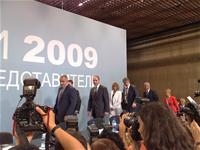 Having wrote all the above, the news from last night are two: Boyko Borisov will be the new prime minister of Bulgaria because the will of the voters showed this and, secondly, he will start negotiations with all parties on the formation of a government. The interesting thing if that he had already had a meeting with the UDF (United Democratic Forces which is part of the Blue coalition) leader Martin Dimitrov and not with the co-leader of the Blue coalition Ivan Kostov. Asked about the doubts of Mr. Kostov regarding the past of Mr. Borisov, the new prime minister said that if that was true, he would not propose anything to Mr. Kostov. "After all I have nothing to do with Balkan (the ex-state airline company of Bulgaria, privatized during the term of Mr. Kostov as prime minister 1997-2001), with hospitals etc. Like I said, I've already spoken with Mr. Martin Dimitrov, we will see".
Having wrote all the above, the news from last night are two: Boyko Borisov will be the new prime minister of Bulgaria because the will of the voters showed this and, secondly, he will start negotiations with all parties on the formation of a government. The interesting thing if that he had already had a meeting with the UDF (United Democratic Forces which is part of the Blue coalition) leader Martin Dimitrov and not with the co-leader of the Blue coalition Ivan Kostov. Asked about the doubts of Mr. Kostov regarding the past of Mr. Borisov, the new prime minister said that if that was true, he would not propose anything to Mr. Kostov. "After all I have nothing to do with Balkan (the ex-state airline company of Bulgaria, privatized during the term of Mr. Kostov as prime minister 1997-2001), with hospitals etc. Like I said, I've already spoken with Mr. Martin Dimitrov, we will see".
Beside this he indicated for a serious change of election legislation as one of the first tasks of the new cabinet, together with the Law for Sofia, clearing the way for the construction of a garbage factory in Sofia, the exchanges of state assets law which he, in fact approves under certain conditions when there is no other option. To be more specific he explained that the owners of a garden near the Russian church in the Bulgarian capital have all pretenses to ask their land to be returned to them but they have to be compensated because no one would approve any construction near the Russian church. And more: Mr. Borisov promised decrease of political administration - sharp cut of the number of the deputy ministers and deputy district governors because this would save millions.
Of course there are many questions surrounding the economic accents in the programme of GERB, criticised both from left and right. So the greatest test of the youngest party and its leader would be to prove that they are ready for dialogue, public dialogue. Especially in moments of severe financial and economic crisis the effects from which are hard to predict, it would be very important GERB not to repeat the mistakes of its predecessors and explain each action clearly with no hints. There are indications that Boyko Borisov understands this because last night he said: "If tomorrow we mislead the voters, we will go where the king is right now" (the ex tsar would barely make it in Parliament while in 2001 his party won overwhelmingly with over 40%). And if Mr. Borisov does not remember this, we will.
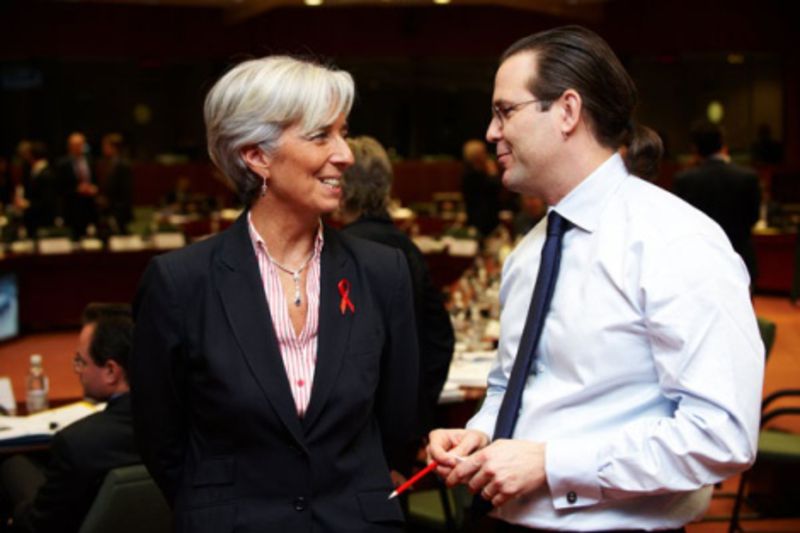 | © Consilium
| © Consilium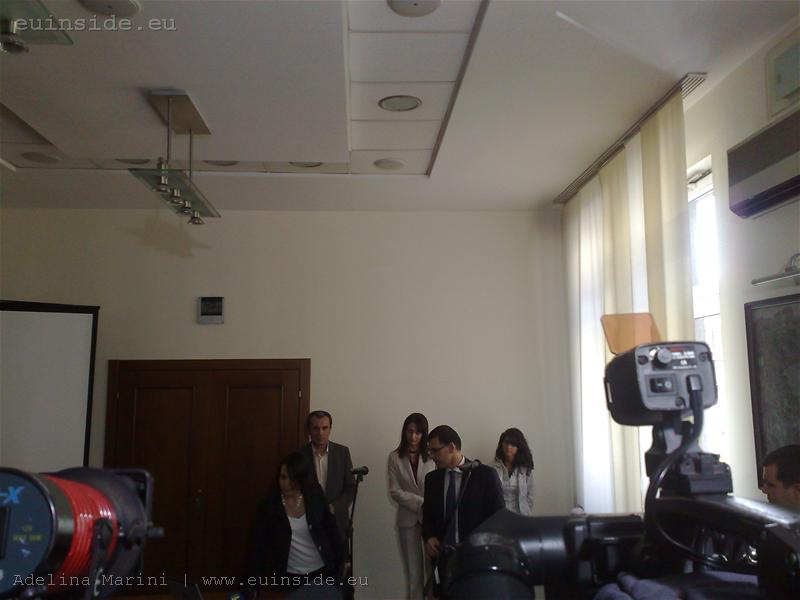 | © euinside
| © euinside